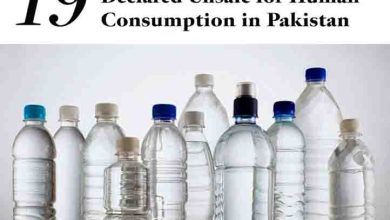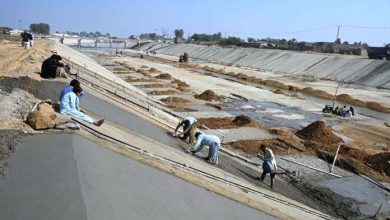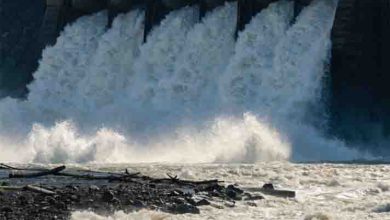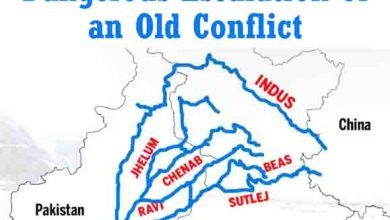PM Shehbaz Slams India’s Dangerous Move to Weaponise Water Resources – A Threat to Regional Peace
Prime Minister Shehbaz Sharif strongly criticises India for weaponising water and threatening the Indus Waters Treaty. Learn how this impacts regional peace, Pakistan’s climate resilience, and future water diplomacy.
In a powerful statement that shook diplomatic circles, Prime Minister Shehbaz Sharif accused India of weaponising water — a deeply concerning development that may threaten regional stability. His comments came during a strategic visit to the National Emergency Operations Centre (NEOC), as Pakistan confronts intensifying climate threats and cross-border water tensions.
The focus keyword “India weaponising water” opens a troubling chapter in South Asia’s hydro-politics and climate diplomacy.
PM Shehbaz Sharif’s Bold Stand at NEOC
While addressing senior officials and disaster experts at the NEOC, PM Shehbaz Sharif made his position unequivocally clear:
“The enemy is trying to use water as a weapon,” he declared. “We will not allow unilateral action on the Indus Waters Treaty.”
Sharif’s remarks reflected growing frustration in Islamabad over New Delhi’s recent stance toward the Indus Waters Treaty (IWT) — a landmark 1960 agreement brokered by the World Bank to fairly distribute water from the Indus basin between India and Pakistan.
India’s Unilateral Posture on Indus Waters Treaty
India’s ongoing construction of upstream hydropower projects and its rhetoric questioning the relevance of the IWT raise alarms in Pakistan. Unilateral withdrawal from such a vital treaty would not only breach international law but also jeopardize peace in the subcontinent.
Experts argue that India weaponising water undermines long-standing diplomatic norms. According to The Diplomat, water disputes are becoming a tool of hybrid warfare, especially when climate variability is amplifying regional water scarcity.
Read more about the Indus Waters Treaty – World Bank Overview
Diamer-Bhasha Dam: Building With Dignity
In response, PM Shehbaz Sharif recommitted to completing the Diamer-Bhasha Dam, calling it a non-controversial and essential infrastructure project.
“Pakistan will not beg. We will build, and we will do so with dignity,” he vowed.
This dam, located in Gilgit-Baltistan, has faced delays for decades due to funding and regional tensions. But now, with increasing water insecurity, it’s viewed as a strategic necessity rather than a luxury.
Related: WAPDA’s Vision for Water Security
Climate Injustice and Pakistan’s Vulnerability
PM Sharif also touched on the broader theme of climate injustice, lamenting that countries like Pakistan — which contribute less than 1% to global carbon emissions — bear the brunt of climate disasters.
“We are now on the map of nations vulnerable to cloudbursts and glacial bursts – events we did not cause, but must now survive,” he stated emotionally.
Pakistan ranks among the top ten most climate-vulnerable countries, despite its minimal emissions. The Global Climate Risk Index has consistently highlighted Pakistan’s fragile geography, particularly its dependence on glacial water and monsoon rainfall.
Swat Floods: A National Tragedy
Last week’s devastating flash floods in Swat Valley serve as a grim reminder of these risks. The floods killed at least 49 people, with dozens more injured or missing. Sharif called the disaster a “national wound” and demanded an impartial review.
“Let this not be buried in bureaucracy or politics,” he urged, instructing NDMA to provide a comprehensive report and coordinate with provinces for disaster planning.
Internal Link: Read our in-depth report on Swat Floods 2025
Modernising NDMA for Disaster Preparedness
The Prime Minister also praised NDMA’s transformation since the 2022 floods, which affected over 33 million people and caused $30 billion in damages.
He toured the NEOC’s upgraded facilities and commended their real-time monitoring, early warning systems, and public risk communication.
Yet, he reminded stakeholders that preparedness must be constant and dynamic:
“The next disaster will not wait for red tape,” he warned.
Global Partnerships and Resilient Infrastructure
PM Shehbaz revealed that the government has tasked Planning Minister Ahsan Iqbal and Climate Change Minister Musadik Malik to secure global grants and encourage public-private partnerships.
He emphasised that Pakistan seeks:
“Not loans, but investments in resilience.”
International climate finance mechanisms, such as the Green Climate Fund and Loss and Damage Fund, could offer avenues for Pakistan to build robust flood defenses, early warning systems, and sustainable dams.
Green Climate Fund – Official Site
Conclusion: Unity and Urgency Required
The Prime Minister’s address resonates with two urgent messages:
- India weaponising water is not just a diplomatic dispute; it is a regional crisis in the making.
- Climate vulnerability demands national unity, swift action, and global solidarity.
In this era of climate uncertainty and transboundary challenges, Pakistan must prepare for more than just floods — it must prepare for deliberate water stress from its neighbour. Building dignified resilience is the only path forward.
Internal Links Suggestion:







